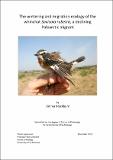The wintering and migration ecology of the whinchat Saxicola rubetra, a declining Palearctic migrant
Abstract
For migrant birds, the non-breeding season can greatly influence survival and future reproductive success. Knowledge of annual and overwinter survival, the degree of site fidelity and habitat use in the non-breeding season, migration ecology, routes and stopovers, and whether these differ with age or sex is fundamental to understanding population dynamics, vulnerability to anthropogenic habitat degradation, and consequently for understanding the severe widespread declines of migrant bird species. The degree to which a migrant is a winter specialist or generalist is likely to be central to understanding population dynamics. I studied survival rates and the wintering and migration ecology of a declining Palearctic migrant, the whinchat Saxicola rubetra, wintering in West Africa, to establish how the non-breeding season may influence migrant population dynamics. Whinchats were extremely site faithful to both within and between years, holding distinct winter territories and returning to those territories in subsequent winters, despite the opportunity to relocate. Overwinter survival was very high and annual survival was comparable to or higher than that reported on the breeding grounds. Because our power to detect resident and dispersing birds was high, survival rates likely estimated true survival well. Habitat characteristics varied widely across territories and territories were smaller if more perching shrubs and maize were present. Most individuals showed a tolerance or even preference for human modified habitats. Some individuals may have multiple wintering sites. There was no evidence of dominance-based habitat occupancy or any differences in winter ecology, site fidelity, survival and most aspects of migratory behaviour between age and sex classes. Migratory connectivity occurred only on a large-scale and individual migratory behaviour was also varied. Fundamentally, the results suggest a generalist strategy in the non-breeding season within their wintering habitat of open savannah, most likely as an adaption to stochastic site selection within the wintering range for juveniles undertaking their first migration plus changing and unpredictable conditions both within and between years. Consequently, wintering conditions may not significantly limit whinchat populations and mortality is probably highest during active migration. Notably, non-specialist migrants such as whinchats may have some resilience at the population-level to the increasing anthropogenic habitat modification occurring in Africa, suggesting that conditions during migration and in Europe may be driving declines; yet establishing the currently unknown thresholds of any resilience is likely to be fundamental for the future conservation migrants.
Type
Thesis, PhD Doctor of Philosophy
Collections
Items in the St Andrews Research Repository are protected by copyright, with all rights reserved, unless otherwise indicated.

